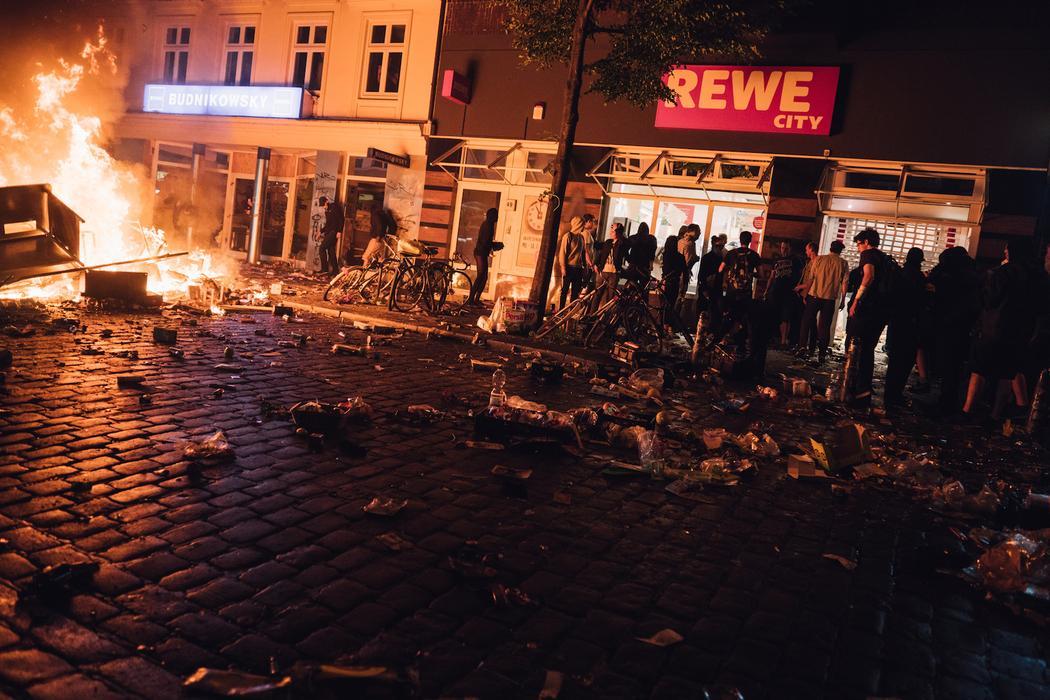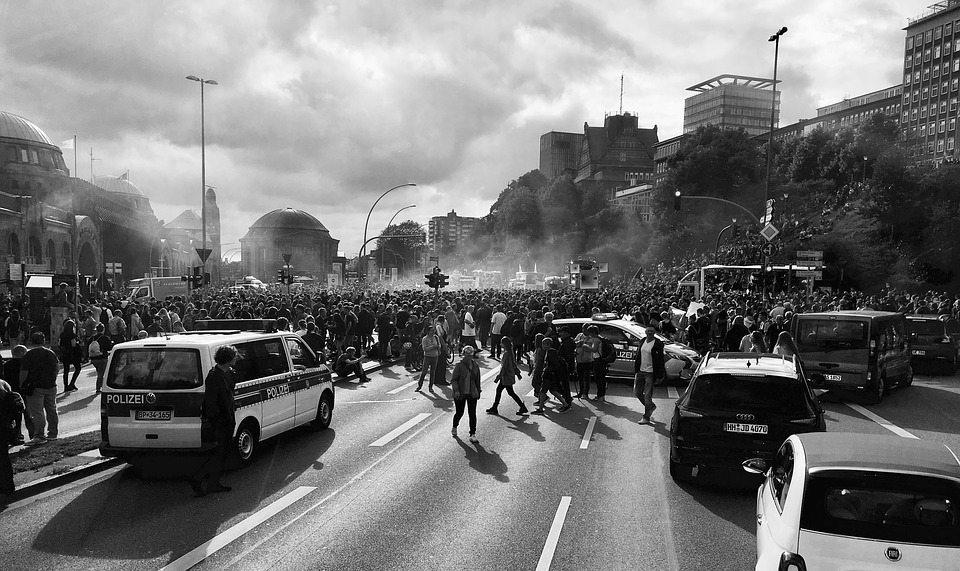As London meandered through Soho in support of queer liberation at Pride this Saturday — all hell broke loose in Hamburg, Germany. The G20 summit assembled the twenty richest nations with a line-up of world leaders that would make the 30s blush. Trump wasn’t the only cantankerous demagogic ham in attendance: India served Hindu nationalist realness with Narendra Modi, Turkey offered old-school authoritarianism in the form of Recep Tayyip Erdogan and Russia played it straight down the line with the world’s most reliable homophobe, Vladimir Putin.
German Chancellor Angela Merkel’s choice to hold the G20 in Hamburg, a city with a vibrant left-wing tradition of anarchists, autonomists, militant feminists and anti-capitalists was a gamble. Supposedly she sought to prove to the smorgasbord of authoritarian dick-swingers around her that peaceful demonstrations could take place without the brutal repression her fellow leaders engage in. What actually went down was something quite different: the city burned and i-D spent the weekend avoiding water cannons, pepper spray, airborne bricks and the occasional burning Porsche.
Activists in Hamburg and across Europe had been organising for months. They were angry at the array of authoritarian leaders in attendance, furious at the failing Paris agreement on climate change, sick of free market neo-liberalism and demanding an end to African debt, and the groups in attendance ranged from the centrist to the revolutionary, the peaceful to the ultra-violent.

Demonstrations began in earnest on Thursday: the anarchist, autonomous and anti-capitalist blocs assembled for the “Welcome to Hell” demo in St Pauli, in the heart of the city. Leading the demo was the black bloc, a masked, anonymous collective willing to use force to break through police lines to literally block the G20 summit. Police tempers frayed and water cannons were unleashed on the crowd. Then the pepper spray came out. The crowd, around 10,000 strong, fragmented and regrouped to march through various arteries of the city. Some joined the street rave along the Reeperbahn, others marched through the neighbourhood of Altona, where activists had set up lively protest camps for travelling demonstrators.
Police scrambled to regain control and riot vans screeched through the city. Chants of “Tout le monde déteste la police” [everybody hates the police] boomed through Hamburg and cars and dumpsters were set alight as bottles rained down on riot vans and police officers, and thick smoke clouded the city air.
The first of the larger demonstrations took place on the Friday morning: Block G20, a coalition of around 160 groups from across the political spectrum assembled in different coloured blocs. Each group worked its way toward the “blue zone”‘ the downtown region in which the German government has banned all demonstrations for security reasons. The groups converged and a mass sit-in delayed G20 proceedings. Melania Trump was unable to leave her guesthouse due to roving anarchists setting fire to private property. Sad!

Marches took place across the city and the Hamburg police requested federal reinforcements from states across Germany. A peaceful assembly at Millerntor, the ground of famed left-wing and anti-fascist football club FC St Pauli, was soon surrounded by police. The mood switched, the black bloc assembled, and the march ended up storming on to raised walkways looking over the central train station. Landungsbrücke, one of the largest bridges in the city, was occupied. Waves of black clad activists advanced into the surrounding hills. The police were outnumbered and bricks, paving stones and flash bangs flew at the bewildered officers. When reinforcements arrived, the crowd split and your trusty reporter nearly got his head kicked in.
That evening, tensions rose, in Sternschanze, it felt like all hell had broke loose. Fires raged and heavily-armed special forces were deployed to storm houses where activists were staying. One reporter from German newspaper Bild quoted German police as saying “From now, no more press freedom. Leave now or end up in hospital.” Not being paid enough to get hospitalised, I fucked off.
Saturday was the day of the summit, and an estimated 100,000 people — from centrist greens to revolutionary communists — took to the streets, for a mass, peaceful, protest. “I’m here because I think Trump is a disgrace to democracy all over the world,” said one protester. Another instead came out to “demonstrate against Putin and in support of LGBT rights across Russia.” Migrant rescue groups implored G20 leaders to guarantee safe passage for all crossing the Mediterranean, while others demanded that America recommit to the Paris accord on climate change.

Coverage of the four days in Hamburg has been, for the most part, slipshod and incomplete. It wasn’t just four days of rioting, nor was it a simple case of defensive violence against police repression. Hamburg blurred the line between resistance and riot, political violence and wanton destruction. With all the rigour of Mystic Meg after a couple of cans, the media’s decision to spend more time focused on the body language of world leaders than the hundred thousand demonstrators on the streets has done politics no favours.
Whether supporting or condemning what happened over the last few days, the willingness of young people from Germany to Mexico, to converge and act in concert is the story that got lost in the mêlée. Nico Berg of the Interventionist Left faction of the Block G20 coalition was clear: “If you organise, get people together, and find consensus, you can effect change. If young people don’t want to wake up tomorrow in a world where the police dictate what’s going on, then we need to get on the streets and defend our social rights against authoritarianism.”
Christophe Klein, another organiser, reiterated the message that we should actually be taking away from a weekend of direct action: “Young people are courageous: they don’t fall back when the police show up; they are beaten but they get back up again. Young people give hope, and from hope comes rebellion.”
Credits
Text Edward Siddons
Lead image via Pixabay
Body images Rebecca Rütten
